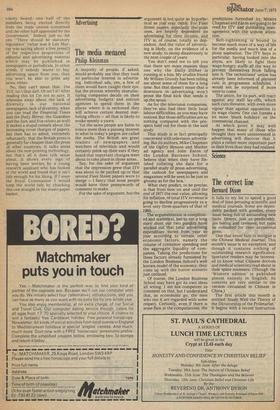Advertising
The media menaced
Philip Kleinman
A majority of people, if asked, would probably say that they took no particular interest in advertising. Individual ads, yes, a few of them would have caught their eye, but the process whereby manufacturing companies decide on their advertising budgets and entrust agencies to spend them in the places where it is reckoned they will achieve certain desired marketing effects — all that is likely to evoke merely a yawn.
Yet the same people are liable to evince more than a passing interest in what in today's jargon are called the media. The British are great readers of newspapers and watchers of television and would certainly prick up their ears if they heard that important changes were about to take place in those areas.
Say, for the sake of argument that the impression grew that ITV was about to be packed up or that several Fleet Street papers were to merge — I fancy that most people would have their pennyworth of comment to make.
For the sake of argument, but the argument is not quite as hypothetical as you may think. For Fleet Street papers, especially the posh ones, are heavily dependent on advertising for their income, and ITV is, of course, totally so dependent. And the value of advertising is likely, on the evidence of a new study, to slump disastrously in the next couple of years.
You don't need me to tell you that there are more reasons than one why the Daily Dither is running at a loss. My erudite friend Mr William Grundy has been telling me about some of them for a long time. But that doesn't mean that a downturn in advertising won't prove the final kick that sends it up the spout.
As for the television companies, they've also had their little local labour difficulties, as you may have noticed. But those difficulties are as nothing compared with the prospect held out for them in the said study.
That study is in fact principally concerned with television advertising. But its authors, Mike Chapman of the Ogilvy Benson and Mather ad agency and John Eaton of the London Business School, believe that when they have finished collating the data for a parallel study of press advertising, the outlook for newspapers and magazines will be seen to be just as gloomy as for the box.
What they predict, to be precise, is that from now on and until the end of 1977 the real value, allowing for inflation, of total ITV revenue is going to decline progressively to a level only three-quarters of that of 1969.
The argumentation is complicated and statistical, but to cut a long story short our two pundits have worked out that total advertising expenditure varies from year to year according to certain other economic factors, namely the volume of consumer spending and the aggregate liquidity of companies. Taking the predictions for these factors already furnished by the London Business School's well known model of the economy, they come up with the horror scenario just outlined.
Of course, the London Business School may have got its own ideas all wrong. I am not competent to comment on that, but I understand that, as economists go, the men who run it are regarded with some respect. Certainly, even if there is some flaw in the computations, the predictions furnished by Messrs Chapman and Eaton are going to be read by ITV and publishing managements with the utmost attention, Belt-tightening is bound to become much more of a way of life for the media and much less of a pious aspiration. The ITV boys in particular, having looked into the abyss, are likely to fight their wage-hungry staffs all the way to ,prevent themselves from falling into it. The technicians' union has already been informed of planned cuts in programme schedules. I would not be surprised if more were to come.
The union, for its part, will react against any staff lay-offs, which such cuts threaten, with even more vigour than against opposition to its wage claims. One can foresee a lot more 'blank holidays' on the commercial channel.
At which point it may well happen that many of those who thought they were uninterested in advertising will discover that it plays a rather more important part in their lives than they had realised.


































 Previous page
Previous page